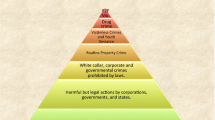Abstract
It is an assumption widely shared by both retributivists and anti-retributivists that revenge is a morally impermissible basis for inflicting harm. Retributivists have thus exercised great ingenuity in demonstrating that retribution is fundamentally different from revenge. But this is, I argue, to misconstrue the problem. The problem is rather to recognize the essential continuity between revenge and retribution, and to address the question whether there is a moral basis for the very idea of inflicting harm in response to moral wrongdoing. I argue that the only plausible such moral justification is the defense of honor, and that the debate needs to be focused on the legitimacy of honor as a moral basis for punishment.
Similar content being viewed by others
Notes
I discuss the Paradox of Punishment in detail in Kaufman 2012, Chapter 1.
For a book-length treatment of the argument as to the moral permissibility of retribution and revenge, see Kaufman 2012.
French’s position is hard to pin down; he seems to oscillate between an emotion-based virtue ethics and some form of conceptual analysis according to which “the very concept of wrongful action entails that such actions are to be met with hostility” (137).
Jo Nesbo, “Revenge, My Lovely”, Sunday Review, May 4, 2014.
French dismisses any possible sociobiological account of the origins of our vengeful instincts as “irrelevant” to the project of justifying them (2001, p. 99).
Again, I am assuming that the utilitarian goal of deterrence is not morally legitimate, either for revenge or retributive punishment. For a full defense of this position, see Kaufman 2012.
The classic expression of this position is Robert Nozick’s Philosophical Explanations Chapter 4 Part III. For more discussion, see Kaufman (2012) Chapter 5.
“Freedom and Resentment,” in Watson, ed., Free Will, 77–79.
These issues are discussed in detail in Kaufman 2012.
References
Christopher, R. (2002). Deterring retributivism: the injustice of “just” punishment. Northwestern Law Review, 96, 843–976.
Feinberg, J. (1989). Reason and responsibility (7th ed. ). Belmont: Wadsworth Publishing Co Inc.
French, P. (2001). The virtues of vengeance. Lawrence, Kansas: University Press of Kansas.
Kaufman, W. (2012). Honor and Revenge: A Theory of Punishment. Dordrecht: Springer.
Nozick, R. (1981). Philosophical explanations. Cambridge: Harvard University Press.
Pinker, S. (2011). The better angels of our nature. New York: Penguin Books.
Solomon, R. (1990). A passion for justice. New York: Addison-Wesley.
Strawson, P. (1982), “Freedom and Resentment,” in Free Will, ed. Gary Watson, New York: Oxford University Press, 59–80.
Author information
Authors and Affiliations
Corresponding author
Rights and permissions
About this article
Cite this article
Kaufman, W.R.P. Revenge as the Dark Double of Retributive Punishment. Philosophia 44, 317–325 (2016). https://doi.org/10.1007/s11406-015-9675-6
Received:
Revised:
Accepted:
Published:
Issue Date:
DOI: https://doi.org/10.1007/s11406-015-9675-6



